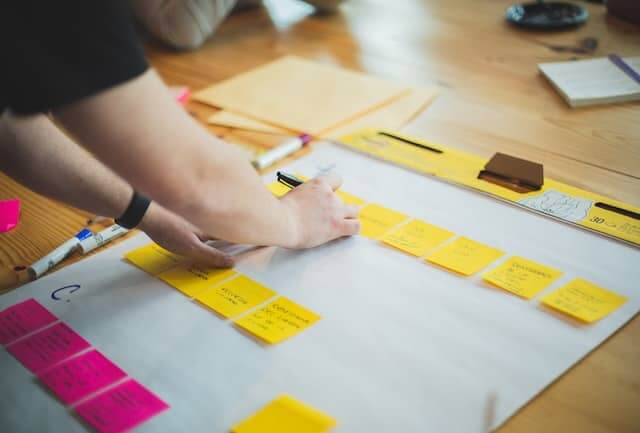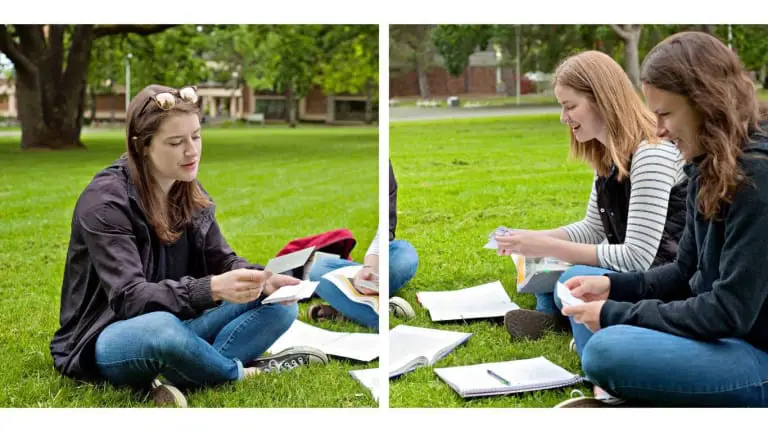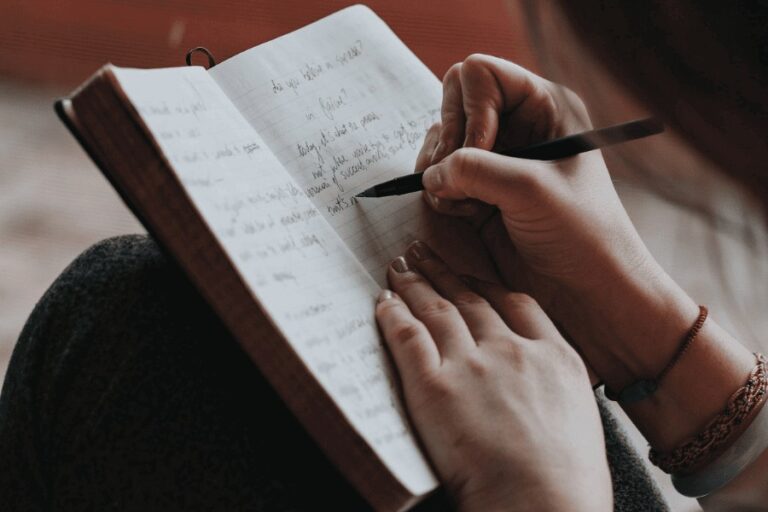Are you looking for the best practical tips on ways to study when you are tired? My top tips will help you avoid sleepiness and fatigue while studying effectively when you're tired.
Trying to study when you've had a fun student night out or simply because you've been burning the midnight oil cramming, can make it really hard to carry on studying when you feel tired.
As a former student, it's a feeling I remembered all too well and it sucked. This is why I've put together my top tips to help you improve your academic performance when you are tired.
So although you may need a little bit of a kickstart, it is possible to study when you are lacking in energy, my helpful article will help frazzled students get their mojo back and hit their study goals like a pro!
This post is all about how to study when you are tired.
HOW TO STUDY WHEN YOU ARE TIRED
Let's get going (in no particular order) with number 1 of the best ways to study at Uni when you are tired.
1. Take regular breaks
This is obviously a no-brainer. But when you are cramming hard for a test or an exam it can be easy to overlook.
Have a short break, aim to take 10 - 15-minute breaks every hour during your study session, or even a few minutes for a quick walk or doing something else you enjoy.
This can help keep you focused and energised.
2. Switch off your phone

When are you tired of studying // Photo by bruce mars on Unsplash
Avoid distractions by switching your phone off or putting it on silent mode.
You don't need me to tell you how annoying your phone's constant binging in the background can be when you are feeling tired and need to study!
Phones can be huge distractions when studying, so it’s best to switch them off while studying. If possible, place them in another room while you are working on assignments or reviewing course material.
If you're anything like me - you keep your phone with you but just turn it upside down so you can't see any notification that may pop up on your screen.
In today's distracted work, screen time on your phone is very addictive, so it's probably best you put it away.
Out of sight, out of mind- as people say.
3. Best Ways to study at Uni when you are tired - Get some exercise

How to get energy to study for exams // Photo by Jonathan Borba on Unsplash
This can sound a little counterproductive!
The last thing you might feel like doing when you're tired but need to study is to expend even more energy!
But doing physical activity can give you an energy boost that lasts for a few hours after exercising and helps increase concentration levels, especially if you are feeling tired from studying too much.
Try taking a 15-minute break to do some light exercises such as jumping jacks, light stretching or running around the block.
4. Study with friends or classmates

Everytime I try to study, I get sleepy // Photo by Annie Spratt on Unsplash
Studying with someone else can be great motivation if you are feeling sleepy while studying and can also help keep conversations on task so that everyone stays focused on the material at hand.
According to experts such as Dr Carolyn Seaman, professor at the School of Education at Central Michigan University, group study can be beneficial because it “allows students to access different perspectives and knowledge that no one person has”.
So not only will it give you an energy boost if you are running out of steam, but it's also a much better way to study than poring through your course material alone!
5. Get enough sleep

Should I study when I feel sleepy // Photo by Kinga Cichewicz on Unsplash
Sleep deprivation and cognitive fatigue are not good for your health, so just turn off any bright light in your home, crawl under the duvets and go to sleep.
Once again, this is pretty much a no-brainer and great advice but can be tricky trying to get enough sleep when you are working on study material and your energy levels are depleted.
The cognitive fatigue that comes with being tired can lead you to have much caffeine including drinking caffeinated drinks to help you stay awake.
This leads to poor sleep quality later.
Sleep is incredibly important though, so make sure you are getting enough. I understand though at times it can be not the easiest thing to do when you are studying so hard to ace your exams!
The best way to ensure that you are sleeping properly is to have a regular sleep schedule and stick to it.
That means going to bed at the same time each night, setting your alarm for the same time every morning and making sure not to stay up too late studying.
When your cognitive functions are compromised, you need to sleep, so just go to bed.
Aim to get at least 8 hours of sleep per night and keep a regular bedtime routine to maximize your energy level during the day!
Check out more helpful advice on the importance of getting enough sleep when you are at Uni!
6. Develop a study plan
Creating and following a detailed study plan can help keep you focused while studying, even when you feel tired or unmotivated.
Setting realistic goals for yourself each day and breaking up large tasks into smaller parts will make it much easier to stay on track with your studies while managing fatigue.
Find more advice on how to ace your study goals in my 'Study Smart' blog area.
7. Utilise technology

Why am I so tired from studying // Photo by Marvin Meyer on Unsplash
Use technology to your advantage when feeling tired while studying by looking for apps or programs that can help enhance your learning experience.
Some of the best ones are flashcard apps, study reminders, online tutor services and language learning tools. These can help you stay organised and motivated while studying, even if you don't feel like it!
Many universities offer online classes, virtual tutoring sessions, and digital textbooks that can make it easier to access information quickly when needed.
8. Listen to music
Listening to upbeat music while studying can help keep you motivated and awake.
According to experts such as author and professor Dr Richard Wiseman, music with a tempo of around 120 beats per minute can help students stay focused on tasks for longer periods.
Many students find that instrumental, classical, or jazz music is especially helpful in maintaining focus while they work.
9. Take power naps

When you are tired of studying // Photo by Adrian Swancar on Unsplash
Learning to power nap is a great skill that can help you if you are looking for the best ways to study at uni when you are tired!
Allowing yourself 15-20 minutes of rest time during the day will help replenish your energy stores so you can get back to studying feeling refreshed.
Just make sure not to exceed 45 minutes of rest, as it could cause you to feel more tired afterwards instead of revitalised!
10. Avoid your bedroom
The most convenient place to study generally if you are in dorm rooms or shared apartments is usually also the place where you actually sleep!
However, it's best to avoid studying in any places that are associated with sleep so you don't feel more drowsy than you might otherwise be!
If you can, study in areas other than your bedroom, like a library, coffee shop, or somewhere else that's brightly lit in your house.
This will help train your brain to disconnect from work mode when it's time to sleep.
11. Have a snack

How to stay awake and study when you are tired // Photo by Maksim Shutov on Unsplash
Often blood sugar can dip while you are studying which can make you feel tired or feel low on energy. If the body isn't getting enough sugar or glucose, it can be tough to focus because brain cells aren't working as they should according to medical experts.
Have a balanced diet. It sounds fairly obvious but try having a small healthy snack such as granola bars, nuts, dried fruit, or yogurt.
This will give your body the nutrients it needs without overloading your stomach and causing you to feel sluggish.
If you need a little more than a snack, then try hitting the tuna mayo ( fish is brain food!) Check out my other helpful article for tips on why eating healthily is important.
10 Good Eating Habits For Students: Why are Meals Important at Uni?
12. Stay hydrated- drink enough water
It is also important to drink lots of fluids when studying. Nothing beats drink that good old water, everyone can agree it's good for you.
Dehydration can cause extreme fatigue and make concentration difficult – so keep a bottle of water at hand while you work, not your hundredth cup of coffee.
According to advice by experts such as the American Heart Association, adults should drink at least eight 8-ounce glasses of water a day.
Other experts such as the National Sleep Foundation recommend increasing hydration levels throughout the day to help you stay energised and focused.
So, make sure you drink plenty of water!
13. Go for a short walk

What to do when your brain is tired from studying // Photo by Eric Masur on Unsplash
Just like exercising, going for a walk and getting some fresh air is good for your physical health without the need to depend on energy drinks to stay awake.
The effects of exercise such as going for a short walk by stretching your legs really get that blood circulation going in your body. It can also get the part of the brain that handles memory consolidation cementing the study materials you learned in your brain.
Your brain activity will be off the charts.
14. Do the easy things first
When you're tired you don't have the energy to tackle difficult topics, so instead do the easier things first. Once the easiest things are done and out of the way, then you can focus on the next easiest thing to do, and so on.
A good study strategy is to break up difficult tasks/ topics into smaller, more manageable tasks. The easier subjects you can complete quicker and it will give you the confidence to tackle the bigger more challenging tasks/ topics.
15. Chew gum
Chewing gum, especially flavoured gum like mint flavour is a great way to combat mental fatigue.
It's a handy little tip that you can do in the middle of a study session to help you study when you're shattered.
Simple but effective!
16. Study in a well-lit room
I'm not saying don't study under artificial light - just that the study space you are studying in is well-lit. This will remind you to stay awake.
If the room was dark then all that would do is remind you of bedtime and sleeping.
Well-lit study areas keep you awake so you can see the study material better and pay more attention, even when you're tired.
17. Make studying consistently a part of your routine
Successful university students make studying CONSISTENTLY part of their daily routine. They recognise that they have precious time to study, so know it is a good idea to study a little bit every single day.
This helps the study material transfer from your short-term memory to your long-term memory.
Trust me, when exam season comes around. You will thank me.
18. Avoid All-Nighters at all cost
All-nighters are the enemy - avoid them, DO NOT do all-nighters - period! They are not worth it. When you are tired, if all else on this list fails, when night time comes- just go to sleep.
Focus on developing good study habits which means you never have to do an all-nighters, ever.
19. Switch between topics or tasks
If you are feeling tired when studying your current topics or doing your current task, then just switch the task you're doing to another topic/task.
Sometimes your brain just needs a reset and focusing on a different task can provide that shift in mindset.
20. Watch a scary movie

How to study when tired - watch a scary movie // Photo by Jakob Owens on Unsplash
Watching a scary movie can mentally provoke you to stay away when tired. But this can be a double-edged sword.
Never watch something scary on the night of your exam. Instead, just go to bed and get a good night's sleep so you can wake refresh and ready to take your exam.
21. Avoid cramming
If you've made an effective study plan that you are actively following through on, then you won't need to cram. Cramming is one of the most ineffective study techniques out there.
The information gained through cramming really ends up in your long-term memory.
22. Change your study time to fit your energy level
Some people are morning people and some people are night owls. Ask yourself, when do you have the most energy? When do you feel more awake? What time of day do you feel less tired?
I myself am a morning person, I get all my energy in the morning when I first wake up.
23. Use evidence-based study techniques
Over-studying is a real thing, you can spend hours upon hours studying and still feel like you're not learning enough. That's because the study techniques you are using are inefficient and not scientifically proven to work.
Effective study techniques are:
- Active recall - actively testing yourself and asking yourself questions on the study material. The more you recall the stronger the bonds and associations form in your mind to that information, meaning you are more likely to remember and recall it when needed.
- Space repetition - spaced out your revision over several days to interrupt the forgetting curve and transfer the information into your long-term memory.
24. Lighten your work-load
Don't spread yourself thin. Ask yourself, are you always tired? If the answer is yes, then you have too much on your plate and you need to trim the fat so to speak.
Reducing your workload is a good place to start. This does not mean you don't do hard work, it just means from now on you are studying SMARTER, not harder.
25. Study with the Learning style that works for you

How to study when tired // Photo by Brands&People on Unsplash
First, do you even know what learning style works best for you? For example, are you a visual learner, or an auditory learner etc.
If the answer is no, then you need to find out.
Find out what learning style you are on the Education Planner site here
After you find out your learning style, try to use study methods that would fit you best like:
- Visual learners - use mindmaps, flashcards, and post-it notes.
- Auditory learners - listen to study music, listen to the recorded version of your past lectures
26. Use ad blockers on your browser

Study fatigue symptoms // Photo by Joshua Hoehne on Unsplash
The last thing you want to do when you are trying to study by using your browser to do some research is an annoying ad popping up on your computer screen.
Use an ad block to prevent that from distracting you while you're in the zone, tired as you may feel.
Popular browsers such as google and Firefox has ad-block extensions that you can install to block those annoying ads.
They are also similar websites to ad blockers where you can lock your computer into a program and if you don't finish whatever you are doing by a certain time, it deleted everything. I wouldn't recommend those sites.
Numerous factors such as your reaction times being diminished when you are tired can affect the effectiveness of the results you would get.
Personally, I would be annoyed as hell, if I spent hours studying when I'm tired only to lose everything because I was too tired to press a button in time - ahh the irony!
27. Experiment to see what works for you
If you've found a method that you think might work for you, that wasn't mentioned in this article, then I encourage you to give it a try. It just might work for you.
No list of reasons regarding how to study when you are tired is ever truly exhaustive. If you want good grades then you need to start playing a more active role in obtaining them for yourself.
Your professors can only mark what you put in front of them, so experiment when studying to make sure your submissions are the best they can be.
Discovery requires experimentation - Marvel's Agent of Shield
28. Eat healthy and proper food

Wow to motivate yourself to study when you are tired // Photo by Ola Mishchenko on Unsplash
Is there such a thing as healthy fats?
You must take good care of your body to maintain good health. Just like exercise is good for you, eating healthy and proper food is also good for your body.
Eat those greens!
29. Take a cold bath or hot bath
Nothing wakes you up more than having a shower. Whether it's hot or cold, you can almost guarantee having a body wash will keep you awake for longer.
F.A.Q!
Do top students study even though they are exhausted?
Successful students who are at the top of their class don't study when they are exhausted because they set goals and create effective study schedules and stick to them. Top students know that trying to study when you are exhausted is an ineffective study strategy, that can lead to poor grades.
Final thoughts on studying when you are tired...
Don't study when tired, don't do that to yourself, just don't- I wouldn't recommend it. It's just not an effective way to study and ironically the amount of sleep time you waste trying to study when tired would have served you better when you sleep.
This is because when you sleep, the associations and links formed when studying are consolidated and bound better in your brain. So, you're more likely to remember what you've learned when you awake the next day.
Find more advice on how to study smarter and ace your study goals in my 'Study Smart' blog area.









![Can I Carry My Laptop on a Plane? [Rules & Regulations For Safe Travel]](https://roshelinarush.com/wp-content/uploads/2023/03/Can-you-Bring-a-Laptop-on-a-Plane-768x511.jpg)


